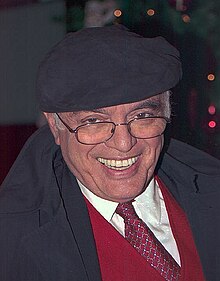
Back روبرت نوفاك Arabic روبرت نوفاك ARZ Robert Novak Spanish Robert Novak French Robert Novak NB Robert Novak Portuguese Robert Novak Romanian Robert Novak SIMPLE Robert Novak Swedish Роберт Новак Ukrainian
Robert Novak | |
|---|---|
 Novak in 2002 | |
| Born | Robert David Sanders Novak February 26, 1931 Joliet, Illinois, U.S. |
| Died | August 18, 2009 (aged 78) Washington, D.C., U.S. |
| Alma mater | University of Illinois Urbana-Champaign |
| Occupations |
|
| Spouses |
|
| This article is part of a series on |
| Conservatism in the United States |
|---|
 |
Robert David Sanders Novak[a] (February 26, 1931 – August 18, 2009) was an American syndicated columnist, journalist, television personality, author, and conservative political commentator. After working for two newspapers before serving in the U.S. Army during the Korean War, he became a reporter for the Associated Press and then for The Wall Street Journal. He teamed up with Rowland Evans in 1963 to start Inside Report,[1][2] which became the longest running syndicated political column in U.S. history and ran in hundreds of papers. They also started the Evans-Novak Political Report, a notable biweekly newsletter, in 1967.
Novak and Evans played a significant role for CNN after the network's founding. He worked as a well-known television personality in programs such as Capital Gang, Crossfire, and Evans, Novak, Hunt, & Shields. He also wrote for numerous other publications such as Reader's Digest. He died of a brain tumor on August 18, 2009.
His colleagues nicknamed Novak the "Prince of Darkness",[3] a description that he embraced and later used as a title for his autobiography. He started out with moderate or liberal views, but later served as a notable voice for American conservatism in his writing and television appearances.
Cite error: There are <ref group=lower-alpha> tags or {{efn}} templates on this page, but the references will not show without a {{reflist|group=lower-alpha}} template or {{notelist}} template (see the help page).
- ^ Cite error: The named reference
telewas invoked but never defined (see the help page). - ^ The column was also known as Inside Washington.
- ^ Schmich, Mary (August 23, 2009). "Pundit's persona wasn't reality TV". Chicago Tribune. Illinois: Tribune Content Agency. Retrieved June 11, 2022.
Novak said that TV was responsible for his right-wing persona. Yes, he'd grown more conservative through the years -- who doesn't, he wondered -- and no, he never said anything on TV that he didn't believe. But abortion? Gay rights? Gun control? As he put it, they weren't high on his agenda, which is why he didn't write about them much. Those issues, however, are the big neon talking points of TV's political agenda.